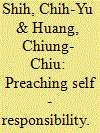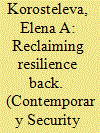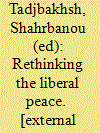|
|
|
Sort Order |
|
|
|
Items / Page
|
|
|
|
|
|
|
| Srl | Item |
| 1 |
ID:
099259


|
|
|
|
|
| Publication |
2010.
|
| Summary/Abstract |
That the transition to self-governance under a nation-state has not been accompanied by the greater focus on Indian citizens' welfare which many expected, has been the source of much confusion and disappointment. Looking at late-colonial debates about property rights under Hindu personal law, this paper seeks to explain why people assumed that independence could change the relationship between the state and Indian society, and also why this has not come about. It argues that, from the latter half of the nineteenth century, economic, social, and political changes placed pressure on the very hierarchical structures of joint-family patriarchy that colonial rule had hitherto depended on. Calls for family reform seemed, at certain moments, to critique patriarchal control and social order more generally, creating the intellectual space to rethink the place of women within the family, and the state more widely. Yet, while couched in the language of women's rights, underpinning these reform debates was an interest to change men's property rights and enhance their individual control over the family. Thus, the interwar years witnessed not just a breaking down of an old colonial patriarchal order, but also the establishment of a new, post-colonial patriarchy based around the authority of the propertied husband.
|
|
|
|
|
|
|
|
|
|
|
|
|
|
|
|
| 2 |
ID:
123968


|
|
|
|
|
| Publication |
2013.
|
| Summary/Abstract |
The present study traces the cultural and political contexts within which Beijing considers global governance. They include: (1) Confucian dispositions toward non-interventionism and self-governance; (2) the socialist collectivist ethics that stress persuasion instead of unilateralism; (3) a lingering sense of inferiority arising from underdevelopment that harms self-confidence; and (4) the repugnant experiences with the United Nations (UN) and the United States that have dominated most international organizations since World War II. The consequential Chinese style of global governance is reactive rather than proactive, problem-solving rather than goal-driven, and attentive to obligation and reform more in other major countries than in failing states. That said, China could still assert global leadership by acting as a model of self-governance for other major countries and by intervening in failing states only through closed-door persuasion and exemplification as opposed to open sanctioning.
|
|
|
|
|
|
|
|
|
|
|
|
|
|
|
|
| 3 |
ID:
171159


|
|
|
|
|
| Summary/Abstract |
Resilience seems to have become “the everyday” covering many aspects of our lives and the policy agenda of major international institutions. However, despite the upsurge in its popularity, are we sure we understand resilience well enough to make full use of its potential? Is resilience just about an entity and its qualities, the knowledge of which could help us improve its response to adversity? Or is it more about resilience as governance-thinking which could enable local communities to self-organize to build life they have reason to value, with external assistance as necessary? Tackling these fundamentals is important, not least to ensure that resilience is not another buzzword but an opportunity to make governance more adaptive. This article argues that resilience cannot be engineered externally, and requires local communities, aware of their own strength and capacities, to actualize their own potential in their strife for “good life,” the way they specify.
|
|
|
|
|
|
|
|
|
|
|
|
|
|
|
|
| 4 |
ID:
108741


|
|
|
|
|
| Publication |
Oxon, Routledge, 2011.
|
| Description |
xiv, 251p.
|
| Standard Number |
9780415600552
|
|
|
|
|
|
|
|
|
|
|
|
Copies: C:1/I:0,R:0,Q:0
Circulation
| Accession# | Call# | Current Location | Status | Policy | Location |
| 056387 | 303.66/TAD 056387 | Main | On Shelf | General | |
|
|
|
|
|
|
|
|
|